Understanding what your customers say is critical in today’s fast-paced, direct to the consumer world. If your business is selling to millennials, perhaps you should know these terms?
Happy New Year!
Below are OdinAnswer’s Predictions for the top slang words for 2020, and it’s the year of Yeet!
Before sharing this year’s list, a word on how we construct the Top-10 Index. If that’s not important to you, feel free to scroll past the methodology section below, directly to the results.
A Quick Word on Methodology
Most of the Text Analytics/Natural Language Processing (NLP) platforms are rather bad at identifying new terminology, acronyms, buzzwords, new product names, etc. as most utilize proprietary or public domain ontologies (dictionaries with words). However, custom terminology is so important in the real world that before text analytics can be very useful for a company, a custom dictionary must be built to allow for these terms that may designate unique product features, processes, etc. related to a product or service or the community of customers who use it. OdinAnswers platform has always been unique in that it very quickly allows users to identify these completely different (hitherto unknown terms).
Without getting too deep into the boring methodology, our Slang Index below is comprised of a combination of what Odin has seen in “unique” comment data from younger demographics online in the wild as well as in survey data. Data are weighted by age, region, gender, and anything that is not considered slang is usually removed. i.e., politically slanted terminology such as “Fake News” and “Snowflake” while captured when they came into usage, were dismissed as those terms are more mainstream than slang. This year, for instance, in our #2 spot, we have thus far allowed “OK Boomer” to take the #2 slot because of its brand new and current popularity among the key demographic. However, this is partly a temporal anomaly, and the term already has broader and more political usage, and so while we’ve allowed it to remain in 2nd place, for now, we may remove/stop tracking it as “slang “next year. In such a case, the 11th place term “Vibe” will move up into 10th place.
Five Years of Tracking US Slang
After what felt like a bit of stagnation in the usage of new slang last year, this year almost half of our top-10 list are débuting terms (Slaps, Fire, Cap, and “OK Boomer”). Also, nearly making the Top-10 list this year was another new term, “Vibe” or “Vibe Check.” If you don’t know the meaning of the top 10 terms, you can scroll to the bottom for our attempt at defining them. Slang terms are tricky as not only does usage wax and wane, but the meaning of the same terminology not only is in constant flux but may also have different meanings at any given time and place.
Before getting to the meanings behind the top slang terms, a few comments about the trends we’ve observed over the past couple of years.
THE YEAR OF YEET
First, our top term this year, Yeet has enjoyed surprisingly fast growth, especially considering its origin as a dance move popularized in part on YouTube and in Memes. We began tracking Yeet in 2015, and it nearly made the top 10 in 2016. Since 2017, in just three years, it’s climbed to first place as its meaning has changed from a cool dance move to a versatile term that can be used for almost anything, especially if done with vigor.
THE FUTURE IS LESS LIT
Lit remains popular, while replaced as #1r by Yeet and (probably temporarily) by “Ok Boomer.” A brand new term on this years’ list “Fire” which means something really good/amazing/hot might further degrade “Lit” which has a somewhat similar meaning. However, Lit is most often used to describe an event or place (for instance, a party), while “Fire” is most commonly used as an adjective to describe almost any noun. “That girl is fire,” “this song is fire,” or “OMG, this food is fire!”
FETCH DIDN’T HAPPEN
Finally, “Fetch” a term that really tried to make it to top place for quite some time, took a turn for the worse last year, and this year didn’t even make our top-10. Ironically “Fetch” wasn’t even a real slang term to start. It was a joke in a 2004 movie called Mean Girls. But it’s been growing in popularity in the real world ever since (primarily among females). In the movie, Regina George discourages her friend from using the term “fetch,” saying, “Stop trying to make Fetch happen!”. Ironically, especially white girls/women have been trying to make Fetch happen ever since. It looks like the endeavor has finally failed.
Of course, there’s a lot more that can be said about the ever-evolving trends of slang, especially if we look at things by age, region, or gender. But suffice it to say, understanding what your customers or critical demographic are saying, how they are saying, and what that means is a critical part of customer listening. With that said, here are our definitions for the top 10 + this year’s bonus term “Vibe Check.” Happy New Year!
Top 10 Slang Terms + Bonus Defined
A lot of Top-10 Lists usually start with #10, and climactically work their way to #1. However, when it comes to slang, the newest terms are generally the newest ones, that not many are yet using, but that will be the freshest slang of tomorrow. So, without further ado, here are our top 10 in rank order, plus a bonus term which we think may soon enter the top 10.
Note, when it comes to slang, definitions are incredibly tricky, because unlike regular words that have an agreed-upon dictionary meaning, slang is far more dynamic (and secret). Those who use the terms want to show they are part of an elite subgroup. What’s more, is that the very same slang term can have drastically different meanings year to year and even have multiple implications deeding on whom uses it, where and in what context. Furthermore, there is no one source out there that conclusively defines slang terms. However, good sources that help you triangulate on what the most current meaning might include UrbanDictionary.com, KnowYourMeme.com, Genius.com/rapstats, twitter tags, and YouTube videos. Pay attention to the dates of entries on these sites, as an older popular post may not be the most currently accepted definition. With that said, here is our best attempt at explaining the top-10 terms.
#1 Yeet – Originally a straightforward Hip Hop dance move, Yeet has expanded incredibly and can now be used as an exclamation, a verb, or even a noun. “Yeet, it’s 2020!” “I’m going to Yeet this!”. Basically, it can be used to describe anything done with vigor.
While not the best current definition or explanation for how it has evolved, this page on KnowYourMeme does a great job explaining where the term originated.
And since Yeet made #1 this year, thought it might be appropriate to share this interview with the 13-year-old boy whos original Yeet video helped propel this term into fame:
#2 ”OK Boomer” – A dismissive retort mocking Baby Boomer generation (Generation born 1946~1964) for being out of touch.
A catchphrase, it is often used as a standalone rather than incorporated into a sentence. While it’s been around in various forms (responses in forums, meme images, songs, and TikTok videos, it’s recent ascent in usage seems due to politics, especially global warming, most notably perhaps the New Zealand Politician below:
#3 Lit … A few years ago, as Lit began to change in meaning, it skyrocketed up in usage. Initially lit most often referred to being intoxicated (“He’s lit.” “Let’s get lit.”). Still, as the term changed in meaning to indicate that something is exciting, fresh or worthwhile, as when used in a phrase like “Come on down to the party, it’s lit!” usage propelled the term up our list in 2017 to first place where it remained for three solid years until now.

#4 Cap or Capping – A brand new term on our list this year, a “Cap” is no longer the funny insult/roast it was when you went to school. Nor is the primary meaning shooting someone as in “capping someone” or “putting a cap” in someone. A “Cap” as it is used today is a lie or saying something false. Conversely, “No Cap!” means something like “seriously” or “No BS.” It can also be used as a verb, i.e., “Stop Capping!”.
In the intro to this popular Blueface video, ‘Stop Cappin’, (which gained over 5 million views on YouTube in just the first 4 days), a gangster equates “capping” with being “all hot air.” He then also references an older meaning of cap:
#5 Bet… Just as Cap has a new purpose, so does Bet. Often slang terms can reverse in terms of the original meaning of the word. OdinAnswers saw this start happening to “Bet” in 2017/2018, and as the term gained a new meaning, so did its popularity.
Bet has moved from a simple term indicating agreement, e.g., “want to go to the movies?” “Sure, Bet!” to the complete opposite, a term connoting doubt, sarcasm, and disagreement. In other words, a term that initially basically meant “yes” now means “no.” For instance, “Yo, can you help me clean my room?” “Bet (leaves walks out of the door).” The new meaning is basically a sarcastic “No.”
That said, Bet can still be used in just its original meaning of “Yes, ok” as well. It’s just cooler than ok:
#6 Dope – Dope is still dope. i.e., high in quality or mind-blowing. One of our new Top 10 terms this year, “Fire,” is a close synonym. If you like you can check out our 2017 definition of Dope here, or watch this Dope movie:
#7 Tea – “Spilling the Tea” means gossiping. Everyone enjoys a bit of tea. Buzzfeed had a pretty funny article on it with several memes you can check out here.
#8 Woke… Woke is one of those exciting slang words, a little like “OK Boomer” in that it is ‘politically’ connected. Because of this, it’s entered the mainstream in a way most slang has not. Still, for now, we’ll continue to leave it in our slang index, even though it’s becoming a bit too mainstream media to be considered slang for too much longer.
Woke first made our Top-10 list in late 2017, and was our fourth biggest mover as of early 2018. Woke means being intellectually aware, on point, and in the know, but can have the broader meaning as well. “After taking that class in feminism, he really woke to gender issues.”
#9 Fire… The first time making out Top-10 list this year in 9th place is Fire. Fire is like Dope, it’s something awesome, excellent, crazy amazing – the Bomb! “Yo, those shoes are Fire!”
#10 Slaps… Slap, slaps, slapper, slapping. Also, new on the list this year. Related to music, a song, or sound system that sounds good (especially with lots of bass). “This song slaps” or “this song is a slap” or as in the meme below “Don’t you hate it when the new song SLAPS but then you listen to the lyrics and they’re kinda depressing.”
And here’s a slap for you from Twitter.
BONUS #11 Vibe or Vibe Check…
Vibe, is to Chill or be at peace. The use of “Vibe,” which connotates an emotional state (usually positive), has been on the increase in music for several years. Think songs like R. Kelly’s “She’s Got That Vibe,” Nicki Minaj “Give Me Five, It’s A Vibe” (trendy on Tik Tok) and ‘Let me Know’ by Juice WORLD “I found your vibe (Vibe), and I, and I found my high (My high)” to name a few.
However, a more recent increase in “Vibe” comes from several different memes related to “Vibe Check.” You can check out one of them related to TikTok here.
Vibe and Vibe Check seem to be an interesting convergence of a slowly growing slang term with more recent internet memes. It’s still a bit early to tell if its current popularity is more temporary or whether we’ll see it continue to morph and grow this coming year.
In the meantime, leaving you with this Vibe Check from Twitter.
OK Boomer’s, that’s it for this year’s Top-10 list. If you’re not already doing so, get woke to actively listening to your customers. Not just what they are saying, but how they are saying it. We highly recommend frequent Vibe Checks – No Cap! 😉
@TomHCAnderson

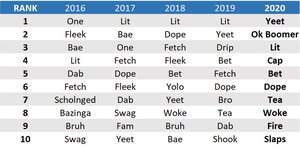
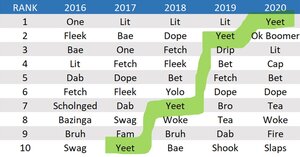
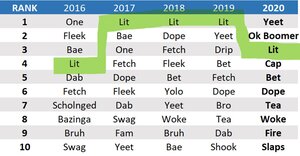
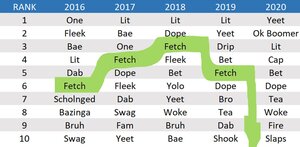
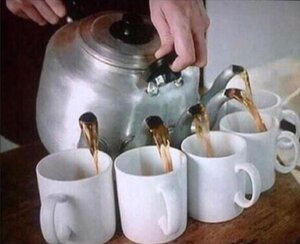
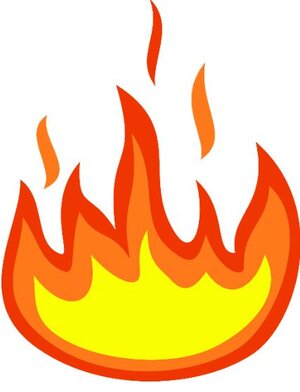
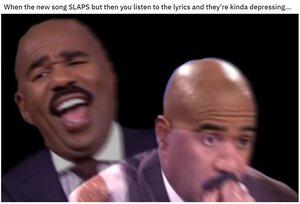
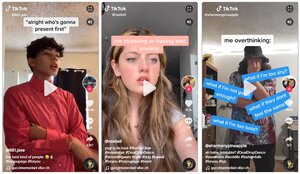








2 Responses
Great stuff – I’m lucky enough to have a 19 year old to keep me on top of all of this – for now at least! The only one she disagreed with was "bet" which depending on tone of voice can reflect its original meaning or the opposite to the original meaning – her view – it is still more commonly used, as a term of "agreement to do something/with something" rather than the opposite!
Thanks @Janet. Yes these terms are in constant flux, with sarcasm, context, regional differences, and media among other things all playing a role. Identifying the terms is very easy for us, understanding the intended meaning can sometimes be a bit challenging. But many of these absolutely have more than one meaning at any given point in time.